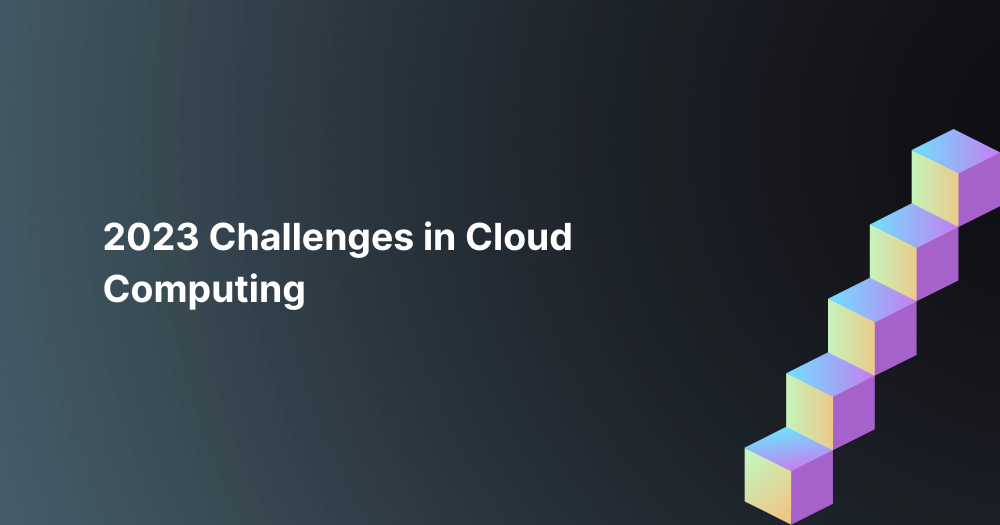
Cloud computing has become integral to many businesses in the modern digital era. Companies continue to realize the advantages of cloud technology resulting in an increasing demand for new and improved ways to take advantage of its capabilities. In addition, as cloud computing evolves, organizations must stay aware of all the potential issues and challenges associated with this IT delivery model.
With that in mind, let’s look at some key challenges that organizations will be faced with in the world of cloud computing over the next few years.
Ensuring data security and privacy when using cloud-based services is one of the most pressing concerns for organizations today. While there have been significant strides to bolster security with encryption techniques and cloud service provider certifications, there is still a risk of data breaches in the cloud. Companies must be aware of these potential threats and take steps to ensure their valuable data is secure.
Cloud computing can offer organizations robust scalability and flexibility. However, it’s important to consider how existing legacy systems will integrate with the new technology. Many companies have invested heavily in their existing system infrastructure and may need to make significant adjustments when moving to the cloud.
Cloud services are often used to quickly create applications and scale up services without investing in additional physical hardware. This makes speed a critical factor when using the cloud. Companies need to be aware of latency issues and adopt cloud solutions that ensure the best possible performance.
Companies need to efficiently manage their resources as they increase their reliance on cloud services. Organizations need to avoid ‘cloud sprawl’. This is when an organization has too many cloud-based applications running simultaneously. This can create confusion and cost overruns for a business, negating the benefits of the cloud. Having clear processes for managing cloud resources is essential.
Numerous advancements in artificial intelligence (AI) and machine learning (ML) have been introduced in the last few years. Organizations are increasingly interested in taking advantage of these capabilities through cloud computing. While this offers exciting business potential, there is still much to learn about how these technologies will work with existing cloud systems.
It becomes increasingly essential for companies to implement adequate governance structures and policies as they move more of their business processes to the cloud. This helps ensure that all stakeholders are aware of how data is being used and stored in the cloud environment and any security protocols must be followed.
Interoperability between different clouds can be complicated, with competing vendors offering proprietary solutions which may not be compatible with each other. Organizations need to be aware of this challenge and look into standardizing their cloud-based services wherever possible. This can be accomplished through vendor agreements and the use of open-source technology.
The volume of data that is generated by organizations and stored in the cloud requires new techniques to analyze and manage effectively. Companies need to look into ways to optimize their big data analytics capabilities and ensure they can leverage the full potential of their cloud environment.
More organizations are now turning to hybrid clouds which are a combination of private and public cloud services to meet their business needs. In a report published by Cisco entitled 2022 Global Cloud Trends, 82% of IT leaders have already adopted the hybrid cloud. Understanding how to properly manage these hybrid clouds regarding security, privacy, compliance, and other areas is essential for businesses looking to get the most out of their cloud investments.
As cloud technology becomes more prevalent, governments are introducing regulations and policies to ensure data security and privacy. Companies must stay up-to-date with changes in the legal landscape related to their use of the cloud. This means implementing the necessary safeguards to comply with diverse regulations ranging from HIPAA and GDPR to new government initiatives such as the Cloud Act in the US.
Venture Beat reports that 49% of organizations have difficulty keeping their cloud spending under control. Companies need to have visibility into how their cloud resources are used to track expenses and make informed decisions for accurate budgeting. Access to up-to-date information on changing pricing models and new services will enable businesses to allocate their cloud budget more effectively.
Overall, it’s clear that there are many challenges associated with cloud computing. However, with the right strategies, businesses can leverage the cloud to its full potential. They can optimize performance, enjoy cost savings, and comply with regulatory standards.
BlackPoint IT is dedicated to helping organizations navigate the ever-evolving cloud landscape. We specialize in providing a comprehensive suite of cloud computing services, from consulting and architecture planning to implementation and ongoing support. Our consultants can help you design the right solution for your organization that meets all your needs in terms of performance, cost savings, scalability, and compliance. Contact us today!